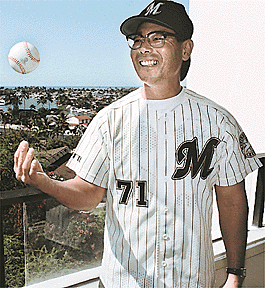

Friday, March 5, 1999

Good to be back
Lenn Sakata returns this spring to
By Al Chase
American baseball—with the Giants—
after four sometimes frustrating years
managing in the Japan leagues
Star-BulletinLLENN Sakata's baseball clock is out of whack. The past four years he was in the sixth week of spring training in Japan by this time.
However, this season he doesn't leave for the San Francisco Giants' spring training complex in Scottsdale, Ariz., until Monday.
Sakata is happy to be back in American baseball after a variety of experiences with Chiba Lotte of Japan's Pacific League.
"I enjoyed most of my experiences in Japan. The most painful experience was dealing with the older generation of managers," Sakata said. "A lot of them didn't care for American baseball ways. After being in American baseball for so many years you could see things that you wanted to change."
He managed Chiba Lotte's minor league team his first season, coached the big league team for two seasons and coached in the minors his final season.
"We finished last my final two years there and they decided they didn't want me back. I was finally fired because I complained too much," Sakata said.

The 14-year veteran of pro ball in this country, 10 of them in the majors, returned to Hawaii and started job hunting. Telephone calls were made and resumes sent out. The Seattle Mariners, Milwaukee Brewers and San Francisco Giants were interested. They all had positions available at the Class A level.The Giants won out because of Hawaii Winter Baseball president Duane Kurisu's strong recommendation about the organization.
"Duane told me it was a first-class organization, a good people organization," Sakata said.
The Giants hired him to manage the San Jose Giants in the Class A California League.
Sakata had managed and coached before in the minors in this country. He coached the Anaheim Angels Triple A team prior to accepting "an offer I couldn't refuse" to go to Japan.
He also believed he had reached a ceiling with the Angels and needed a change.
"Coaching for the Angels was a good break. It gave me experience at all three levels in the minors," Sakata said. "It taught me what to look for, to see how players could develop. In A ball you have to deal with emotional and physical differences and, in the low minors, they (major league team's management) are always telling you how to run your team."
Still, Sakata, who was the shortstop for Kalani High School's 1970 state championship team, is excited about his new job. He expects to experience a rekindling of the passion he has for the game. Sakata has always believed he was more pro-player than pro-management.
"My job is to teach, to give them the edge. I'm not there to make sure their socks are a certain length or to make sure they cut their hair," said Sakata, who turns 46 this summer.
"Yes, you have to have discipline, but all I want is to deal with the talent of each individual and to see if I can enhance what they have. I don't begrudge the money they make these days, but I want kids who understand the tradition of baseball. I don't like the kid who says if I hit .250 and make a million it's OK.
"I can be stubborn, but I just want people to try. I stunk plenty of times, but I kept trying. Getting old has taught me to forgive, to be more understanding. I'm looking forward to the challenge."
In Japan his main responsibility the last three seasons was the middle infielders. He also served as the third base coach.
One thing Sakata found difficult was the inordinate number of signs players and coaches were responsible for knowing. There was a sign for every possible trick play, even ones that might be used once a year or not used at all.
Strategy also differed.
"They like to hit and run with two strikes and they like to squeeze with two strikes," Sakata said.
Another point he pushed was weight training, which does not have universal acceptance in Japan. He suggested establishing a weight training program for the lengthy postseason camp, but that idea was resisted,
"They just practiced and practiced the same stuff, like robots," Sakata said.
Although his knowledge of the Japanese language was limited, he thought that might improve when he went to Japan. But, since he was an American, he was assigned an interpreter.
CAREER NOTES: He played for Milwaukee, Baltimore, Oakland and New York in the American League, finishing with a .230 batting average, 25 home runs and 109 RBIs.
ON HIS CAREER: "I didn't enjoy it as much as I should have. I didn't realize what I had or how short it would be. I was always grumbling about playing time. I made it a battle," he said.
HIGHLIGHTS: Playing in the 1983 World Series is tops. "I also played with some really good players and I would never trade that experience."
ON CAL RIPKEN: "People don't realize he never missed infield, took every batting practice," Sakata said. "He had amazing recuperative powers."
Ripken started his 2,632 consecutive-game streak when he replaced Sakata at shortstop for the Baltimore Orioles, May 30, 1982.